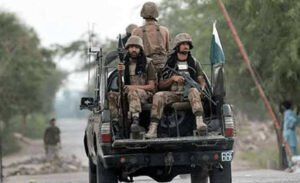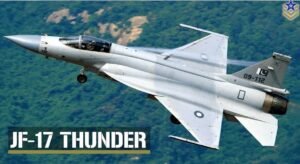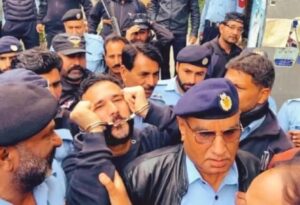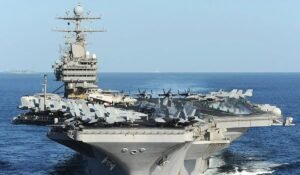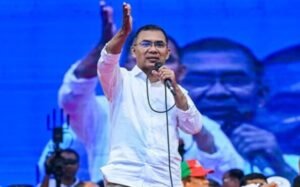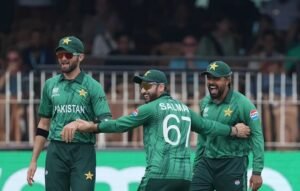Pak army to defend Pakistan till last breath: ISPR chief
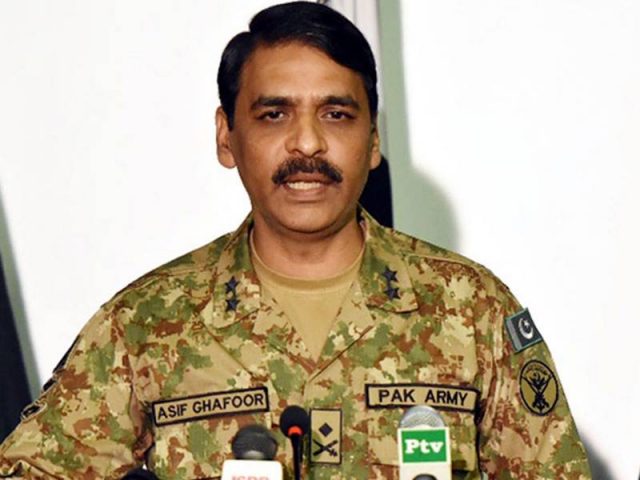
There is a confessional statement by the sitting Indian premier on how they conspired to break the two sections of Pakistan apart
India started showering blame on Pakistan right after the attack happened without thinking, ISPR Director General Major General Asif Ghafoor said at a press conference in Rawalpindi on Friday.
Around 40 Indian paramilitary soldiers were killed in Indian-Administered Kashmir on February 14 in an attack India blames on Pakistan. However, Pakistan has denied India’s accusations.
“Before I talk more about this issue, I want to say some things,” he said. In 1965 our country was progressing but this war had negative impacts on our economy, he said, discussing the history of the conflict between India and Pakistan.
In 1971, India took advantage of the situation in East Pakistan and the geographical distance between the two wings of the country, he said. Their role is well known, he added.
The ISPR director general said there is a confessional statement by the sitting Indian premier on how they conspired to break the two sections of Pakistan apart. When the possibility of war was ruled out due to Pakistan’s acquisition of nuclear weapons, India opted for unconventional strategy and started promoting terrorism in Pakistan, he accused. In 2001, when international security forces started an operation in Afghanistan, India escalated tensions on our eastern border and we had to focus on it, he said. If this had not happened, we would have been in a better position to more effectively stop terrorism from entering our country and it wouldn’t have spread the way it did in our country, he said.
In 2008, when we were fighting against terrorism and gaining progress in our war on terror, once again India brought its forces to the border just to slow our gains, he said, adding that the case of Kulbhushan Jadav is the evidence of that. Contrary to what India was doing, in 1988, we started talks on bilateral confidence building measures, he said, adding that Pakistan has always offered peace.
Major General Ghafoor said that between 2004 and 2008, there were five sittings of the composite dialogue. They discontinued this process in the aftermath of Mumbai attacks. I want to show you the timeline that every time there is an important event in Pakistan or if the situation in Pakistan is becoming more stable, a staged incident takes place in India or Indian-held Kashmir, he said.
The 2001 attack on Indian parliament was just before the general and presidential elections were scheduled to be held in India in 2002, he said. The UNGA was also in session at the time. If you come to Mumbai attack, (26-29 November, 2008) we were progressing in our war on terror and general elections were about to take place in India from February, he said.
He said during the January 2, 2016, Pathankot attack, the US president’s State of the Union address was due and state elections were due in India. Pak-India foreign secretary level talks were also scheduled, he said. The Uri incident took place on September 18, 2018, when our PM was supposed to go and address the UNGA, said the ISPR chief. This pattern tells you that every time there’s an important event in Pakistan, this type of staged action takes place, he said.
Now come to the Pulwama attack on Feb 14, he said, explaining that eight important events were scheduled to happen in February and March this year. The Saudi crown prince’s visit and investment conference, the UN security council to deliberate on Pakistan’s terror listing and the Afghan reconciliation process is going on, he said.
The EU and UN will take up the issue of human rights violations in Kashmir and the decisive hearings of the Kulbhushan Jadhav case in the ICJ, discussion on the FATF report and decision regarding Pakistan will be made, he said. A meeting regarding the development of the Kartarpur border was also due and PSL matches are to be played in Pakistan. Beside these events, India is also heading towards elections and the indigenous struggle in Indian held Kashmir is at its peak, which India is not being able to control, said Major General Ghafoor.
In such environment, as the PM said, how can the state of Pakistan afford to be involved in such an activity. What’s the benefit Pakistan could possibly gain from the Pulwama attack in light of all these events, he asked, adding that it’s against Pakistan’s interest.
He also said that there is a lot of foreign investment coming in to Pakistan right now. Development in CPEC is taking place, military diplomacy and military cooperation are taking place; we are doing joint exercises with many countries including Russian and China and the PAF and US Air Force did exercises together recently, he said.
From the LoC onward, the Indian Army has layered defence, explained the general. How is it possible for someone from the Pakistani side to cross the LoC and that too in an area where the number of forces deployed is more than local population and have been stationed there for 70 years, he demanded. India should ask its forces how this infiltration took place, he urged.
The incident took place miles from the LoC and the explosives used in the attack are used by the their own security forces and administration, he said, adding that the explosives didn’t come from Pakistan. The car that was used was a local vehicle. The attack was carried out by a local Kashmiri youth. Look at his history, how he remained under arrest in 2017 and how he was maltreated by the security forces, he said. He urged India to look at his parents’ video message.
Lot of people in India had predicted such an attack quite some time back, said Major General Ghafoor. It’s the election season and the kind of campaigns that were being run, were highlighted on their social media, he said.
Also, look at the class composition of the soldiers who died in the attack, he urged. If you get the video released of the attacker anaylsed by experts it will also reveals a lot, he said. He said thousands of people attended his funeral in Kashmir.
He said there is no evidence behind India’s accusations and that it should provide evidence for an investigation. We will investigate if you provide evidence of Pakistani citizens involved in the attack, he said.
We first investigated and then replied, he said, adding that Pakistan’s PM made an offer to India regarding the investigation, something India has never reciprocated. He said we are ready for whatever investigation they would like, but we must have evidence. If we are given evidence, we will act, not under pressure from you but in our own interest, he said.
This has never happened before. Whenever we used to talk about dialogue, India used to say that first we have talk about terrorism, he said. Our PM has said come let’s talk about terrorism but it is a problem for the whole region and Pakistan has suffered the most, why would we want to promote terrorism, he asked.
He warned India that if it resorts to aggression, it will not be able to surprise Pakistan. He also addressed the measures India has taken to ‘punish’ Pakistan, such as denying visas to its shooters for an Olympic event or banning the export of tomatoes.
The ISPR chief urged India to examine the evidence and not assign the blame needlessly. He also said the treatment of Kashmiri Muslims is not acceptable. Countries cannot and do not develop alone, he said. He said the path of war will not help development in the region.
In the 21st Century we are faced by a lot of problems, he said. This includes the human development index, he said, adding that India can be an enemy of Pakistan but not humanity.
He said former ISI director general Asad Durrani has been found of violating military code of conduct and that his pension and other benefits awarded to him as a retired officer have been stopped.
We don’t want any physical aggression with India but if there is we will defend every inch of our motherland till our last breath and the last bullet, he said. The army isn’t comprised of just people who wear uniforms, it is comprised of all 200 million citizens of Pakistan who will defend the country, said Major General Ghafoor.
He said the incident in Iran is a regional threat and a regional challenge that needs a regional approach. We are in close coordination with Iran, he said. We need to ensure there is no movement from Iran to Pakistan or Pakistan to Iran, he said, adding that this third party involving itself is a friend of none.
To a question on the Saudi crown prince’s visit to India right after visiting Pakistan, he said countries have relations with each other, which is normal. However, he said the release of Pakistani prisoners and the investment package announced were promising, as were the responses of friendly nations (such as China and Saudi Arabia) to India’s aggression.

